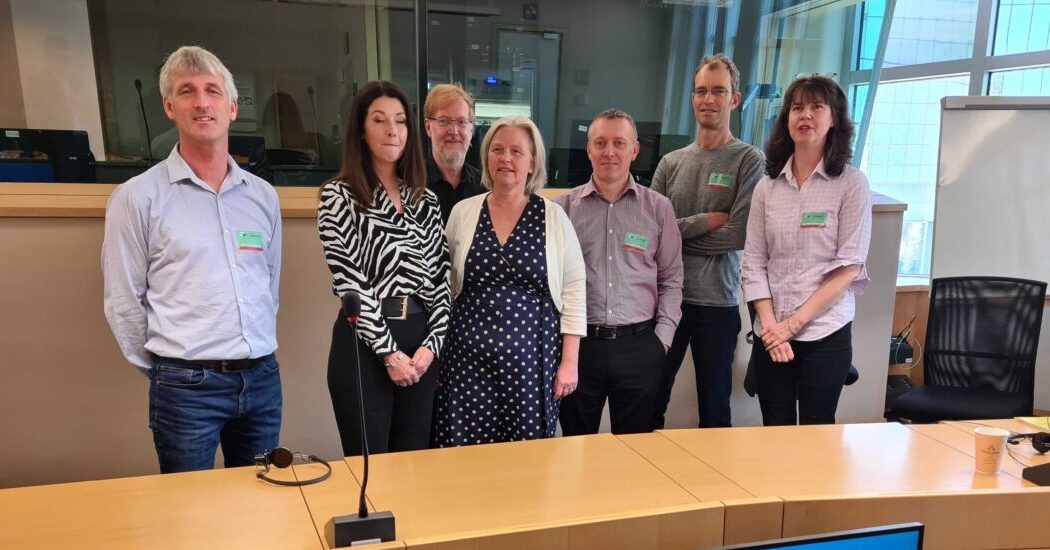A formal complaint is set to be lodged with the European Union on behalf of defective blocks affected homeowners in Donegal.
In a statement released today, spokesperson Joe Morgan said that the complaint will be submitted to the European Commission this week as homeowners look to pile pressure on the Irish Government to take proper action.
“Following an initial presentation to the EU Parliament Petitions Committee in Dec 2021, the EU Parliament conducted a “Mission” to Donegal, in Nov 2023, to see the impact of the crisis for themselves. The report from that visit is eagerly awaited and is due for publication imminently.”
“In the interim period, we have been working on the submission of an official complaint separately to the EU Commission, to coincide with the publication of this report. We can confirm today the complaint is now ready and will be submitted to the EU Commission this week. This complaint will partner a complaint already submitted to the EU Commission by Coleman Legal in the later half of 2023.”
The submission of this complaint will try and again pile pressure on the Government to provide appropriate redress and help for affected householders, many of whom believe the current schemes in place are still wholly inadequate.
Continuing, Joe Morgan said:
“During a visit to The EU Commission in May 2023, in which I was joined by campaigners, Dr Eileen Doherty & Professor Paul Dunlop (Ulster University), Lisa Hone (Chair of Mica Action Group) and Dr Andreas Leeman (Empa, Laboratory for Concrete & Asphalt, Dübendorf, Switzerland), we were advised The Commission needed us to provide an account of efforts within the member state to remedy the crisis, before they would consider an escalation to EU institutions.”
“To this end, we have furnished them with a twenty year timeline of administrative engagement with both regional and national Irish authorities. This timeline was diligently pulled together by Mrs Debbie McCoy, a concrete lobbyist in the United States of America. We have also provided an academic paper published by Dr Eileen Doherty citing missed opportunities to learn from the Pyrite crisis in Leinster which preceded the defective concrete crisis predominated in the North and West of Ireland.”
“We have also furnished the EU Commission with evidence of two legal cases taken within the Irish legislative system. The first of these was taken by a number of families in Inishowen which ultimately failed due to claims that Insurance coverage at the quarry was not sufficient to provide compensation to families. The second of these cases being the two lead cases being taken against the State [DE1] by Coleman Legal.”
“We have also taken the opportunity to highlight the flaws with the current Irish Standard IS465:2018. Recent scientific publications reveal Iron Sulphate attack as the predominant cause of defective concrete in the North & West of Ireland. IS465:2018 focuses solely on the presence of Mica and Pyrite in the blocks used for construction. The erroneous nature of the source of the problem cited within this Irish standard calls into question remediation options cited in the same standard. Science led analysis at the outset of the crisis could have avoided the misappropriation of funds to remedy homes which may well need to be reassessed and need additional works up to and including full demolition. Additionally, the untold stress and turmoil faced by affected families could have been avoided. Further, the remediation of some properties already based on this standard where the outer leaves have been replaced calls into question whether these ‘fixes’ will even work. It begs the question whether these homes will continue to deteriorate as they still contain defective materials.”
“The primary objective of the EU Escalation is to avoid subsequent generations finding themselves in the same scenario as we find ourselves today. Market Surveillance of the construction industry in Ireland is reactive, at best. EU Regulation requires regular testing of aggregate to establish its composition and ensure it is ‘fit for purpose’. Our complaint includes evidence from state bodies confirming Market Surveillance is in chaos in Ireland.”
“As this crisis is entering its third decade, it is our position, The EU Commission itself has been remiss in its m[DE2] onitoring of Market Surveillance implementation in Ireland. To this end, we aim to invoke EU Human Rights Regulation designed to influence the parameters of the existing grant scheme.”
“Although we are hopeful, this political escalation does not come with guarantees. That said, our worst case scenario is that this exercise will provide a foundation for a legal escalation to the EU should current legal activity within the Irish legislative system fail to deliver expected outcomes.”
“The submission of the complaint this week will trigger a twelve month time-boxed initiative within the EU Commission, where they will decide on their next steps. During our visit in May/June 2023, Commission representatives advised us that it was unlikely that this would lead to infringement proceedings in the European Court of Justice, but they concluded that in their experience the political engagement over the twelve month initiative was often enough to effect change within the member state.”
“Special thanks to MEP Luke “Ming” Flanaghan, his team and “The Left Group” for their continued leadership and support in highlighting this issue at EU level.”








